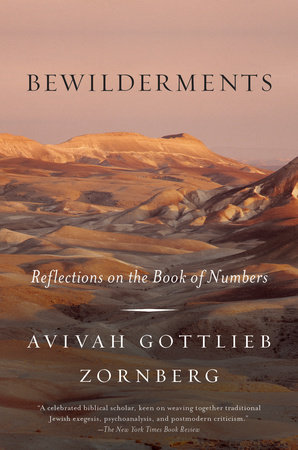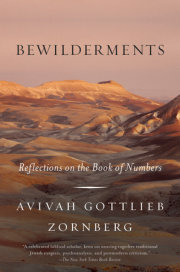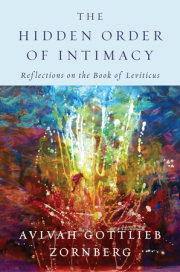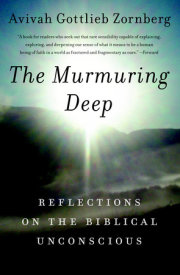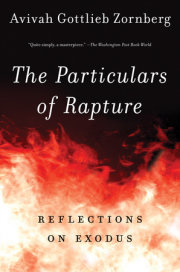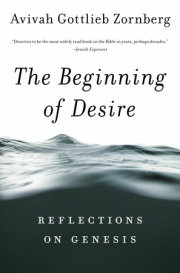PREAMBLE Bewilderments The Hebrew name for the book of Numbers is Sefer Bamidbar, the Book of (lit.) In-the-Wilderness. Although the Israelite wilderness experience begins in Exodus and concludes in Deuteronomy, the book of Numbers claims the interior of this world of wilderness as its peculiar territory. It evokes not only geographical terrain, but also an inner landscape, an “inscape,” as it were—a world of imaginative being.
Between Egypt and the Holy Land, the wilderness intervenes. As the Torah tells the story, this was meant to form a brief episode in the history of the Israelites, a passage between leaving Egypt—
yetziat Mitzraim—and entering the Land. But the brief interlude suddenly and tragically swells to deathly proportions. In one traumatic moment, the divine decree goes forth: this interval will encompass the life and death of a whole generation. Those who left Egypt will sink into the sands of this wilderness. Only their children will see the Land.
What is the nature of this interim space, so terribly extended? The surface of the wilderness proves to hold vertical menace—“Into this wilderness your carcasses shall fall!” the Torah intones repeatedly. This is not simply a walking surface for the traveling people, but a quicksand ready to consume human bodies. The first such bodies figure in the macabre showdown of Korach’s rebellion, where the earth “opens its mouth and swallows” Korach’s followers. They “vanish” from the human landscape, into the netherworld: the hungry maw of the earth has removed them from the surface on which human acts are played out. Nothingness has triumphed over being.
This terrible image haunts the reader, who contemplates the many vanishings of a whole generation. For this is the very nature of the
midbar—of
this great and terrible wilderness. It is an environment that is inimical to human life. Jeremiah describes its singular horror when he reminds the people: “God has led you through the wilderness, through a land of deserts and of pits, through a land of drought and deadly darkness, through a land that no man passed and where no man dwelt” (Jer. 2:6).
This landscape does not yield to human demands: it frustrates the need for food and drink, but also the basic demand for direction, for markings to indicate a human mapping of blank space. No human steps have trod this sand, it stares back at the traveler indifferently—pathless,
bewildering to the human imagination. A kind of horror besets the mind. Already traumatized by their Egyptian past, the Israelites, one by one, must be swallowed into this senseless space.
“A great and terrible wilderness”: the experience of
midbar, extended to the edges of life, suddenly becomes a total experience. These people will never know any other reality. But precisely here lies the central enigma of the narrative. For in its way of telling the story, the Torah creates an illusion of continuity, as though we are throughout reading about the same people who left Egypt. Till the second census in chapter 26, the reader does not clearly understand that thirty-eight years have passed, with their full harvest of death. Only when the text clearly states that in this census there are no survivors from the earlier census at the beginning of the book (26:64), do we realize that, without our noticing, a generation has slipped into the sands. A great interruption has occurred; thirty-eight years have imperceptibly vanished. By chapter 20, in fact, the new generation is already in place. And yet, even then, even after the census and indeed throughout Deuteronomy, it takes an effort to convince ourselves that, in fact, the generations have changed.
At the heart of the wilderness story, then, there is a gap, which is masked by apparent continuities. As often in traumatic experience, the rupture is somehow elided from the official record. The record continues to register the human hubbub of complaint and rebellion to which we have become accustomed. But the fabric of national life has been ripped open; unremarked within that hubbub, ring the death cries and the sudden silence of a generation.
This macabre secret at the heart of the narrative is revealed only after the catastrophe is over. It becomes one of the central “bewilderments” of the book. The other “bewilderment”—also essential to this wilderness—is the lack of
emunah, of
faith, that continuously and repeatedly characterizes the people’s utterances. Classic midrashic sources have suggested that
midbar is closely associated with issues of
dibbur, of language and utterance.
Ein midbar ela dibbur, declares one such source—“Wilderness is nothing but utterance”—cryptically playing with the roots for the two terms. In which case, we can say that the Book of the Wilderness yields a human language of querulous skepticism. Cries and whispers and rages and laments fill the air, a cacophony that God describes as issuing from lack of faith.
At the beginning of the Exodus narrative, Moses protests against his mission of redemption: “But they will not believe me, they will not listen to my voice! They will say, God did not appear to you!” (Exod. 4:1). Moses’ basic sense of the people is that they are
un-believing. His words will fall on deaf ears; he has no power to impinge on their skepticism, which, in his mind, is radical, subversive of redemptive possibility.
God, too, protests at this recalcitrant trait in the Israelite character: “How long will they have no faith in Me, despite all the signs I have enacted in their midst?” (Num. 14:11). Not-believing and having no faith are different nuances of a fundamental posture indicated by the Hebrew word
emunah. This connotes solidity, stability, continuity, validity. God sees the people as
not-trusting. In spite of all the signs, all the indications of His love and His benign purpose, His promise to bring them into the Land is, it seems, deeply
incredible to them. “
Ad anna? How long?” God asks: How inherently unstable is this condition of
no-faith, no-trust!
The posture of
not trusting, ironically, seems to affect Moses also. In the end, God will accuse him of “having no faith in Me, to sanctify Me before the eyes of the Israelites” (Num. 20:12). An epidemic of skepticism has apparently not spared Moses himself, whom God, at an earlier moment, had praised as uniquely
ne’eman—“
faithful in all My household” (12:7).
Skepticisms Strangely, the wilderness seems to bring out latent skepticisms, even in those who are also capable of moments of trust and faith. This same people, after all, did believe Moses’ original message, as God had promised they would. The “signs”—the leprous hand of Moses, his staff that changes into a snake—do their work. And at the Red Sea, the Israelites do see God’s mighty hand and “believe in God and in His servant, Moses” (Exod. 14:31). But this was before the Book of the Wilderness, in another world. In the wilderness space of bewilderment, their language expresses a “desert-sea” of skepticism, as the American philosopher Stanley Cavell, in a different context, describes this state of being.
For Cavell, modern skepticism is to be viewed against the history of an age-old philosophical posture that came to dominate European philosophy and literature from Descartes onward. As a philosophical position, skepticism questions our ability to know the world and its objects, including other minds. But, he adds: “skepticism with respect to the other is not skepticism but is tragedy.” It is a moral stance “in the face of the other’s opacity and the demand the other’s expression places upon me; I call skepticism my denial or annihilation of the other.”
Cavell’s descriptions of this moral posture are informed by psychoanalytic thought: it represents “world-consuming doubt, which is hence a standing threat to . . . human existence”; an “unappeasable denial, a wishful uncertainty that constitutes an annihilation”; an “incurable malady.” Cavell traces the devastations of this malady through Shakespeare’s
The Winter’s Tale—where a king refuses to acknowledge his own son—and through Kant’s
Critique of Pure Reason. It is a fanaticism, nihilism, that no knowing can oppose. At its heart, it wants “there to be nothing,” if there can’t be everything. Its basic question is “How can I trust the basis upon which I grant the existence of the other?”
The response that Cavell offers is drawn from Levinas: “To see a face is already to hear ‘You shall not kill.’ ” If for Kant the scandal of philosophy is that “the existence of things outside us . . . should have to be assumed merely on faith,” then for Cavell “the problem is to
recognize myself as denying another. . . . Here is the scandal of skepticism with respect to the existence of others;
I am the scandal” (my emphasis).
In the wilderness history of the Israelites, this scandal is most acutely expressed in the narrative of the Spies, who, with one word—
efes, zero—obliterate their own faithful report of the “goodness” of the Land.
Efes, usually translated “however,” deletes at one stroke the beauty of the world and of God’s promise. In Cavell’s terms, it represents a failure of
acknowledgment—perhaps even a wish for there to be nothing: not to be born, not to love or marry or acknowledge one’s own son. In the absence of certainty, a core fantasy of disappointment dissolves the possibility of even partial knowledge. The only alternative to this fantasy of annihilation is accepting that the world and its people are separate from us, “as if gone,” and “must be regained every day.” Repeated mourning of this kind is the “condition of the possibility of accepting the world’s beauty.”
The Double Narrative Cavell’s complex view of skepticism frames it as a malady that is also a liberation from dogmatism. In the biblical narrative, the questions that the Spies are commissioned to investigate begin with the radical question
Mah hi?: “You shall see the Land. . . .
What is it?” And again, “
What is the Land? . . . Is it good or evil? . . .
What are the cities?
What is the Land? Is it fertile or infertile?” (Num. 13:18–20). The repeated
Mah?—the “What is it?” question—expresses a necessity of the human mind: to question, to see, to articulate meanings. The Spies’ mission, is, in a sense, to be
skeptical, not to rely on hearsay, or even on God’s original magisterial description of the Land: “a good and spacious Land, flowing with milk and honey” (Exod. 3:8). God Himself, after all, initiated the Spies’ mission. This fact seems to validate a “good” skepticism, the inquiring spirit of those who want to know for themselves what can be known.
However, it seems that “good” and “bad” skepticisms may be expressed in the same words. The midrash offers the analogy of a king who makes an excellent match for his son, only to have his son demand to see the bride for himself. The king is aggrieved at his son’s doubting his word: “Because you did not trust me, you will never see her in your home—she will marry your son!” The prince wants to “see” the bride in order to ascertain her beauty. Is he justified in wanting to find out what only he can know—if she is beautiful
in his eyes? Or is the father right to be aggrieved at his son’s lack of trust?
Perhaps both positions are valid. In “real time,” in Numbers 13:2, it seems that God underwrites the Spies’ mission; but forty years later, Moses retells the story in such a way as to incriminate the people for initiating the project. “I told them it is a good land,” God protests in Rashi’s reading of the story. But the goodness of the Land is ultimately a subjective matter, to be acknowledged, if at all, by the people who are to “marry” it. Is the bridegroom simply exercising the right of an adult to choose a lovable bride? Or is he moved by a nihilism that may reject the very possibility of love?
The double biblical narrative, as well as the midrashic parable, put on view the ambiguity of the issue of trust. This issue, with all its bewilderments, runs through the book of Numbers. The treachery of the Sotah, the woman suspected of adultery, is itself the subject of an uncertainty that the ordeal is to resolve. Is she guilty or innocent?
What is she? But, it turns out, no absolute certainty is to be had. In human affairs, the field of inquiry is never sterile; the wife may have other virtues that cloud the issue, or the husband may have a history of his own that will similarly block the elegance of the proof. If she is innocent, an incomplete certainty frees her from suspicion. If she is guilty, she may confess, and thus avoid the (dis)solution of God’s Name in the bitter waters. From the beginning of the book, the tone is set for the bewilderments of uncertainty, denial, and mistrust; for a bitter dissolution of meaning where certainty is not to be had.
Not-bread from Heaven The skeptical question
Mah hi?—“What is it?”—gives its name to the manna, the bread from heaven, that feeds the people through the wilderness.
“Man hu?—
What is it?” the people ask,
“for they did not know what it was.
” Moses answers: “It is God’s gift of bread.” But it is the question, and not the answer, that names the unknowable substance. This manna, this “What-stuff,” remains enigmatic—it may be a source of sensual variety and pleasure, but at the same time it remains ungratifying, imaginatively
indigestible.
Uncanny stuff, it is in the end remembered by Moses in his last speeches as the very essence of the wilderness experience:
Remember the long way that God your God has made you travel in the wilderness these past forty years, that He might afflict and test you to know what was in your hearts: whether you would keep His commandments or not. He afflicted you and subjected you to hunger and gave you manna to eat, which neither you nor your fathers had ever known, in order that you might know that man does not live on bread alone, but that man may live on whatever issues from God’s mouth. (Deut. 8:2–3)
The forty-year
midbar journey was intended as a difficult odyssey of self-understanding, a reconnaissance mission into the human heart. The manna is essential wilderness food, unknown, uncanny; but precisely in its unknowability it will open a new kind of knowledge: “that man does not live on bread alone but on what issues from God’s mouth.” The sentence communicates the mystery of the manna: it stirs up the question—
What is it that can sustain human life?
For manna is both bread and not-bread; it comes, not from the earth but from heaven, from God’s mouth, like His utterances and the world they create. The manna is an intimate encounter with the otherness that issues from God’s mouth. In a profound sense, the human being lives on language. (S)he comes to realize this by way of the strangeness, the uncanniness of the manna, which does not answer to the familiar needs of the human animal. A substance that tells of the unknown leads the consumer to
see through its flimsy appearance. This is the essential
midbar experience: the unknowable leads the traveler to an imaginative knowledge, which refigures, transfigures the world.
What
issues forth (
motza) from God’s mouth speaks not to the senses but to the human capacity for language, which is intimately connected with the divine. Imagination, as a form of language, creates realities. Human consciousness also undoes such creations, turning back on itself; as David Shulman writes: “this movement back [is] the imaginative act par excellence.”
Copyright © 2015 by Avivah Gottlieb Zornberg. All rights reserved. No part of this excerpt may be reproduced or reprinted without permission in writing from the publisher.

